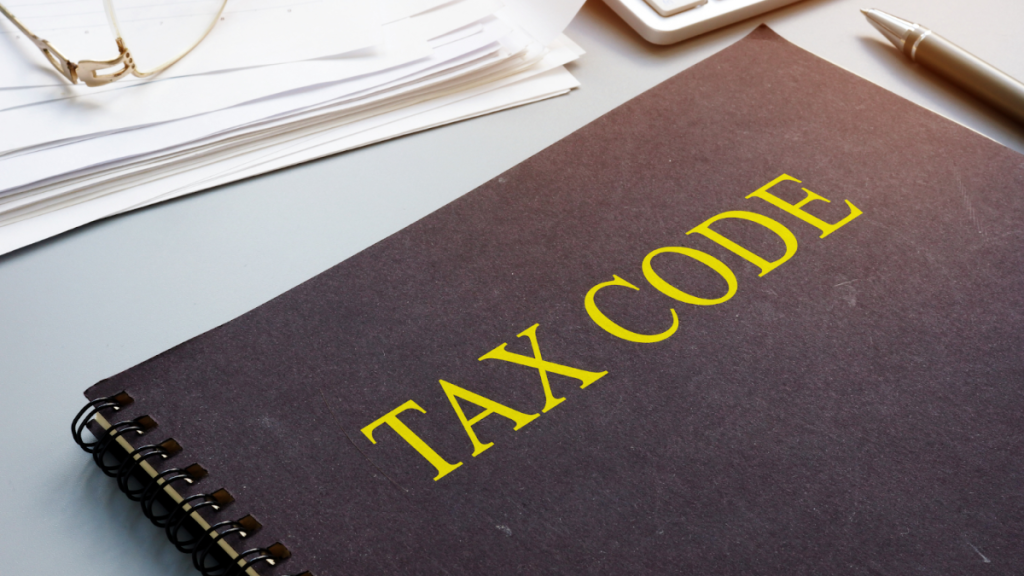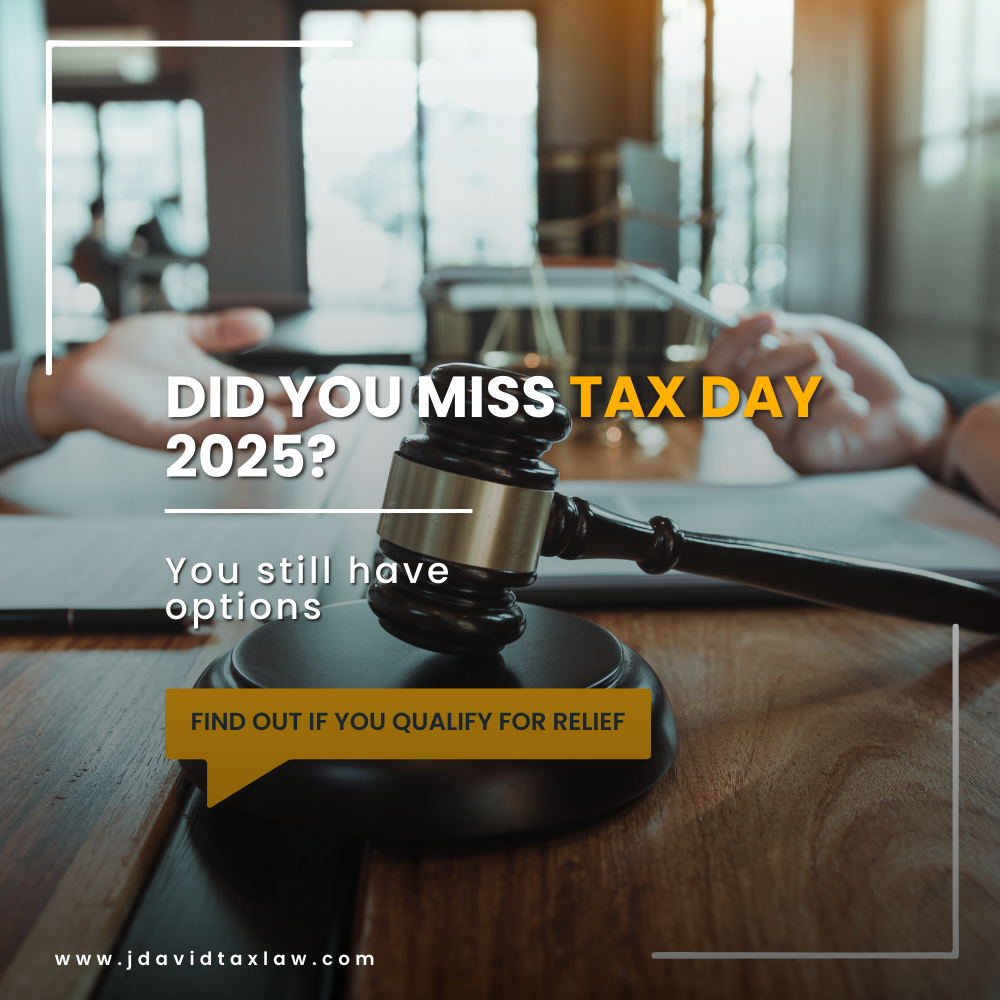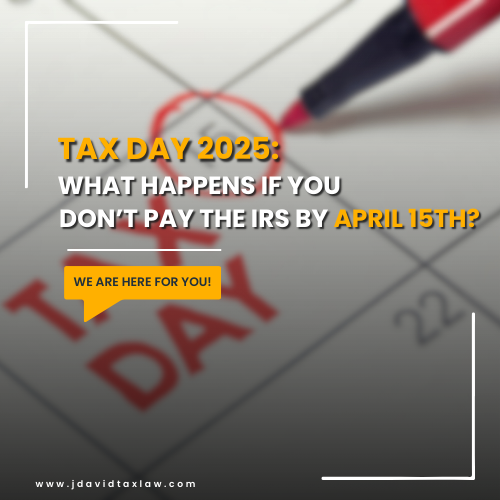Tax Levy
Stop the IRS from seizing your assets—our reliable tax attorneys offer a quick IRS levy release to protect your assets.
Find Out If You Qualify for Tax Relief in 4 Easy Steps!
Check Your Eligibility for Tax Levy Release Today!

Stop IRS Levy Threats in Their Tracks with J. David Tax Law
J. David Tax Law moves quickly to address IRS levies that threaten your bank accounts, wages, property, and other assets. Our tax attorneys work efficiently to negotiate the release or reduction of levied amounts within a short time frame to help protect your financial well-being.
We tailor our approach to your financial circumstances to help you qualify for relief programs like offers in compromise or currently non-collectible status to resolve your IRS tax debt and stop future levies. If paying your full tax debt is not an option, we help secure manageable payment plans through installment agreements.
Are you looking for An IRS Tax Levy Attorney?
Whether the IRS has levied your bank accounts, garnished your wages, seized property, or is threatening further action, J. David Tax Law’s experienced legal team fights to safeguard your assets from seizure while working on an effective tax resolution.
Similar to an IRS levy, a state tax levy is enforced by state tax authorities to collect delinquent state taxes. Both types of levies occur after the taxpayer has been notified of the unpaid taxes and failed to settle the debt, leading to the seizure of assets to recover the owed amounts. These aggressive collection methods can cause significant financial hardship, making it essential to address tax debts promptly.
Don’t let the IRS seize what you’ve worked hard for—reach out now, and take control of your assets and safeguard your finances with our professional levy tax debt attorneys today.
Eligibility Requirements for Tax Levy Release
To qualify for a tax levy release, certain criteria must be met. The IRS typically releases a levy if it determines that the levy is causing undue financial hardship or if you have taken significant steps toward resolving your tax debt.
Key tax levy eligibility requirements:
• Financial Hardship: If you can prove that the levy is preventing you from meeting basic living expenses, you may qualify for a release. This requires providing detailed financial documentation to the IRS to demonstrate that the levy is causing undue hardship.
• Installment Agreement: If you set up an approved installment agreement or Fresh Start Program with the IRS to pay off your tax debt over time, the levy may be released as part of the agreement. The IRS is generally willing to lift the levy once a payment plan is in place.
• Offer in Compromise: Submitting an offer in compromise to settle your tax debt for less than the full amount owed can also lead to a tax levy release. Once the IRS accepts your offer, the levy is typically removed.
• Proving the Levy Is Unnecessary: If you can show the IRS that releasing the levy will help you pay off your debt faster, the IRS may agree to lift the levy. This requires careful negotiation and proof that you can resolve the tax debt more efficiently without the levy in place.
• Collection Due Process Hearing: If you request a Collection Due Process (CDP) hearing by filing IRS Form 12153, the levy could be temporarily released while the hearing takes place. This provides an opportunity to present your case and potentially have the levy lifted.

Secure Levy Release with the Top Tax Attorneys

Free Tax Consultation
Get started with a no-cost, no-obligation consultation. We will discuss your options and outline a strategy to stop the levy and resolve your tax debt.


Eligibility Evaluation for Levy Release
Our experienced tax attorneys will assess your eligibility for relief based on financial hardship, potential installment agreements, or offers in compromise.

Form Submission and IRS Negotiation
We handle the submission of critical forms such as IRS Form 12153 for a Collection Due Process hearing if need be and negotiate directly with the IRS.

Removal of Tax Levy
Our attorneys work to remove the IRS levy – whether through currently non-collectible status or a other resolution of your tax debt.

Free Tax Consultation
Get started with a no-cost, no-obligation consultation. We will discuss your options and outline a strategy to stop the levy and resolve your tax debt.



Eligibility Evaluation
Our experienced tax attorneys will assess your eligibility for relief based on financial hardship, potential installment agreements, or offers in compromise.

Settlement & Resolution
We will examine the cause of disagreements with the tax authorities, and explain to the client if their views will prevail against the opinion of the IRS.



Tax Litigation
When a difference of opinion can’t be resolved during a tax audit, a taxpayer may file a tax appeal to get a final decision from a tribunal.

Our experienced tax lawyers specialize in the tax levy process and release, providing personalized legal strategies to protect your assets and minimize financial damage.
Why Choose Our Tax Lawyers for Levy Tax Help?
Taxpayers receiving notice of levy often experience significant financial strain, from frozen bank accounts to seized property, which can disrupt daily life and cause undue stress. At J. David Tax Law, we understand how overwhelming these situations can be, and we are here to help. We act quickly to stop the levy and help you regain control of your finances.
Negotiating with the IRS can be intimidating, especially when facing the potential loss of your property or income. That’s why we take a proactive approach, using our deep knowledge of IRS procedures to negotiate effectively on your behalf. Whether by proving financial hardship, arranging installment agreements, wage garnishment release or pursuing other relief options, our team works tirelessly to secure the release of your levy and resolve your tax debt with confidence.
Visit our latest taxpayer help blog to learn more about how levy release works.
What Are Your Choices If IRS Tax Levy Release Fails?
Appeal the Decision
Apply for IRS Currently Non-Collectible Status
Negotiate an Installment Agreement
Submit an Offer in Compromise
Request a Partial Levy Release
What happens if I ignore an IRS tax levy?
Ignoring an IRS tax levy notice can lead to severe financial consequences, including the continued seizure of your assets, wages, and bank accounts. The IRS may also take further action, such as filing a federal tax lien or initiating legal proceedings. It’s crucial to seek immediate help from a tax attorney to address the levy and explore legal claim options for relief. For more information, you can check out this blog about the implications of tax levies.
Can the IRS garnish wages and levy my bank account?
Yes, the IRS has the authority to garnish your wages and levy your bank account at the same time. This can put significant strain on your finances, making it essential to act quickly to resolve the underlying tax debt. Our tax attorneys and legal team can help you negotiate with the IRS to lift these levies and protect your assets. You can read this article to learn how our tax attorney can help.
How long does it take to release a state tax levy?
Can a tax levy be reinstated after it's released?
How long does it take to remove an IRS tax levy?
Additional Resources

- Tax Relief
Can a Tax Attorney Negotiate with the IRS?

- Tax Debt
Did You Miss Tax Day 2025

- Tax Debt
Tax Deadline Extension for California Wildfire Victims: IRS Relief and Penalty Help

- Tax Debt
Tax Day 2025: What Happens If You Don’t Pay the IRS by April 15

- Tax Litigation
Civil Tax Litigation vs. Criminal Tax Litigation: What You Need to Know

- Tax Litigation
Corporate Tax Litigation: Common Challenges and How to Overcome Them


